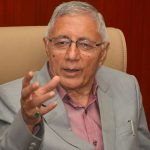
Donald Tusk sworn in as Poland’s new prime minister

The new Polish Prime Minister Donald Tusk and his Cabinet were sworn in by the president on Wednesday morning, in a ceremony which marked the end of eight tumultuous years of rule by a national conservative party, Law and Justice.
The swearing-in ceremony of the pro-European Union government, the final step in a transition of power, took place in the presidential palace in Warsaw. Tusk was returning to the job after a nine-year spell in opposition.
The change of government follows a national election on Oct. 15 which was won by a group of parties that ran on separate tickets vowing to work together under Tusk’s leadership to restore democratic norms eroded by Law and Justice and mend relations with foreign allies that were also strained.
Tusk and his ministers arrived at the presidential palace in a bus in the white and red colors of Poland’s flag and the words: “We thank you, Poland!” They were greeted by cheering supporters.
Tusk’s government won a vote of confidence in parliament on Tuesday evening after an inaugural speech in which he vowed to demand that the West keep up its support for Ukraine. The confidence vote was delayed when a far-right lawmaker used a fire extinguisher to put out the candles of a menorah during a Hanukkah celebration dedicated to Poland’s Jewish lawmakers of the 1920s and 1930s. Tusk and other leaders sharply condemned the antisemitic provocation.
In his policy speech Tuesday, Tusk called on Poland’s fractious political class to unite, saying the nation cannot afford divisions while Russia is waging a war of aggression across the border, a conflict many fear could spread if Moscow prevails.
President Andrzej Duda, an ally of the previous administration, swore in the government after having delayed the power transition as long as he could.
Their disagreements found expression during the ceremony. Duda said that despite the obvious differences he will cooperate on matters key to Poland’s security and the people’s well-being, but stressed that he believes that most things are in perfect shape.
Tusk, whose government was born out of dissatisfaction of majority of voters, said he greeted Duda’s declaration “with great joy,” but also emphatically quoted the words of his oath that vow respect for Poland’s constitution and other laws. Duda’s critics accuse him of bending the constitution, even disregarding it in some cases, as he backed Law and Justice policies.
Tusk was to travel to Brussels later in the day for EU summit and leaders’ talks with the six countries from the Western Balkans that hope to join the EU.
The leader of the centrist Civic Platform party who was prime minister from 2007-2014, Tusk faces challenges that include restoring democratic standards in Poland and working for the release of European Union funding that was frozen due to democratic backsliding by his predecessors – which he promised to achieve quickly.
He also promised to work with European partners to address irregular migration, an issue of growing concern in Poland after thousands of people, many from the Middle East, tried to cross into the EU from Belarus across Poland’s eastern border.
The 67-year-old Tusk has vowed to restore foreign ties strained by the Law and Justice-led government, which bickered even with allies such as Germany and Ukraine and was at odds with the EU over legal changes that eroded the independence of the judicial branch.
Tusk’s Cabinet includes a former foreign minister, Radek Sikorski, taking up that role again. Adam Bodnar, a respected human rights lawyer and former ombudsman, was tapped as justice minister.
Tusk named Wladyslaw Kosiniak-Kamysz, an experienced politician and agrarian party leader as his defense minister. For Kosiniak-Kamysz, 42, Poland’s security is safeguarded by its membership in NATO and the EU. In the face of war across Poland’s border, he has vowed to focus on strengthening the defense potential of the armed forces.
The new culture minister is Bartlomiej Sienkiewicz, a former interior minister under Tusk in the past who happens to be the great grandson of “Quo Vadis” author Henryk Sienkiewicz, a winner of the Nobel prize for literature.












Comments